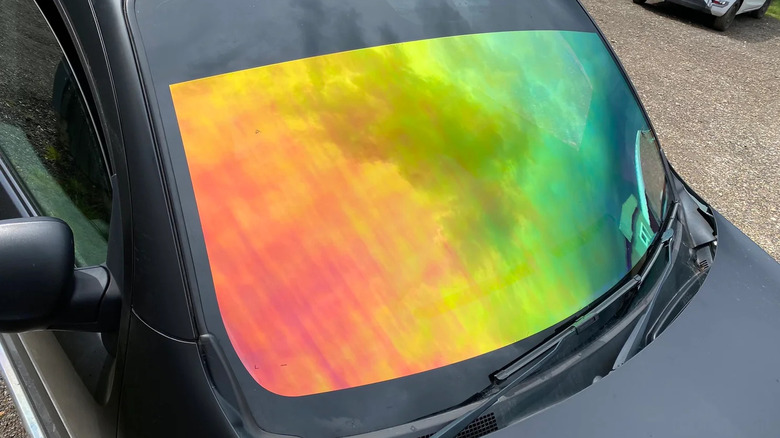What Is Chameleon Windshield Tint, And Is It Legal In The US?
Whether it's for privacy, sun protection, or just looks, window tinting has become a very common car modification. And as things grow in popularity, more options become available. Car owners looking for unique and beneficial window tinting may be curious about chameleon tint windshields.
Generally, window tinting is when a thin laminate film is applied to a car's glass in order to darken it, including the front, back, and passenger windows. There are a lot of reasons car owners want to tint their windows, meaning there's a wide range of needs being met. This creates a lot of different tinting options. How dark should you tint your windows? Can window tinting be a different color? What drivers choose not only depends on their tastes but the legality of certain tint options.
When it comes to chameleon tint, every state has a different law. It can get a bit confusing, so here's what car owners need to know about applying chameleon tint to their windshield.
What is chameleon tint for windshields?
A chameleon tint is essentially a window tint that appears to be different colors. By using multiple layers, chameleon tint creates a color-changing effect depending on the lighting, angle, and weather surrounding the vehicle, similar to the aforementioned lizard. While the driver can see normally from the inside, the angle of the windshield means the color is often reflective of the sky. This means the color you see on the windshield while looking in will depend on whether the sky is bright or cloudy.
Chameleon tint has become widely available to anyone who wants to customize their car, although it started off as a feature for luxury car brands due to its unique appearance. It comes in a wide range of base colors depending on the specialists who install it. Not only is chameleon tint stunning and unique, but it has a lot of benefits for drivers. This includes added privacy while driving or even security while the car is parked since it's difficult to see what's on the seats. Reduced glare and cooler temperatures are other added benefits.
But if chameleon-tinted windshields come with so many benefits, why is there a question of legality floating around the mod?
Is chameleon tint legal in the US?
Chameleon tint is generally legal, but there are a lot of specific rules around it — and those rules even vary state by state.
Dark tints are basically banned across the entire United States. This is due to darker tints making it tough for the driver to see their surroundings, including people, other cars, and trees. Not only does it hinder your own vision, but dark tints can also make it tougher (sometimes even impossible) for other drivers to see you. This means they could miss a signal or attempt at communication, causing misunderstandings, accidents, or worse.
Some chameleon tint is not that dark, however, so it could be allowed in some states. This still depends on how dark it truly is and which windows it's on. For example, most states allow drivers to go darker (up to 70% tint) on the front side mirrors and even darker on the back side mirrors, but the windshield itself is not allowed to be tinted in all 50 states. Each state has a different percentage of tint allowed on each window.
To make it even more confusing, some states that don't mind tints that go a bit darker may find reflective tints illegal. Reflective tints are not allowed in about half of all US states, and the remaining half have specific regulations regarding the use of reflective tints. States that prohibit reflective window tints include Alaska, California, Hawaii, Colorado, Maine, Illinois, and Iowa. Don't even get us started on tinting headlights.
You'll want to check your state's individual laws regarding tinted windows before installing chameleon tint. For example, California doesn't even allow certain colors, including blue and red. This can make it a bit tricky — likely impossible — to get chameleon tint as a driver in the Golden State. To check window tint laws in your state, third-party websites like Tinting Laws or local auto dealers may compile info, but you should verify tint laws for your area through your local DMV or government website.


